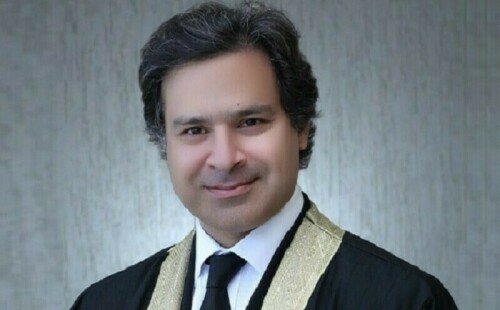ISLAMABAD, Jan 3: Islamabad is making history as the winds of change are blowing in the Saarc region, said Indian Foreign Minister Yashwant Sinha , referring to important breakthroughs achieved on a number of contentious issues during the council of ministers' meetings on the eve of the Saarc summit.
"I have absolutely no hesitation in saying that the winds of change are blowing in the Saarc region. In Islamabad, I have a sense of history," said Mr Sinha, speaking at the Saarc Journalists Summit organized by the South Asia Free Media Association (Safma) here on Saturday.
He said: "Agreements have been reached on the issues that were considered not only as conflicts, but also perhaps impossible."
During the council of ministers meetings, the Indian leader said, the foreign ministers ironed out all the differences over the Additional Protocol on Terrorism and Safta, and the heads of the Saarc states and governments were going to sign the social charter which would set the pace and the agenda for fighting poverty in the region. A decision was also made to initiate studies on advancing the goal of a South Asian Economic Union from 2020 to 2015, and on establishing a single currency in the region.
Mr Sinha said: "We have made a new beginning here in Islamabad."
He said there were problems on Saturday morning due to which the meeting of the council of ministers delayed for a while, because officials were still grappling with some issues in the drafts. However, he said, council Chairman Khurshid Mehmood Kasuri convened the foreign ministers informally and solve the problem.
Mr Sinha said that after the summit was over, Saarc countries would begin a new phase in their relationships.
"And I am not merely talking about the relationship between Pakistan and India, I am talking about a new relationship, a new spirit in all the seven countries of the region."
Supporting the proposal of Safma for the relaxation of visa restrictions on journalists in Saarc countries, Mr Sinha said India would wholeheartedly and enthusiastically support any arrangement made for media persons to travel either with a liberal visa or without a visa.
He said a liberal media regime for free movement of newsmen be adopted immediately and formalised later during the meeting of the council of foreign ministers to be held in July at Islamabad.
The information ministers of Saarc countries, he said, were currently engaged in resolving some issues and would hopefully soon come out with satisfactory results soon.
Mr Sinha urged upon the Saarc member states to leave suspicions, distrusts and the baggage of history behind to achieve the goals of a prosperous and peaceful region.
Speaking about the role of media as a force multiplier, Mr Sinha said the biggest non-tariff barrier for the free movement of media and its products in the region was the suspicion in minds.
Mr Sinha used the occasion to make what he called was a fervent appeal to Pakistan and Bangladesh to change their policies for flow of media products. Pakistan and Bangladesh, he said, were the only two governments of Saarc who continued to restrict the free flow of media products into their countries.
"Please, consider a change in your policies. Indian newspapers, magazines, music, films and television are not going to undermine your societies. Let us break down these artificial walls. The time has come to end this self-defeating approach. South Asia must rise above such short-sightedness."
He said that in the past, the songs of Rafi and Noor Jehan and the poetry of Tagore and Qazi Nazrul Islam wafted across the frontiers to a common heartbeat. He said the media could lead the people of the region to the path of peace and prosperity.
The Indian minister suggested a short-term framework towards the goal of a South Asia Common Media Space. He said correct information was the psychological glue that brought people together and removed suspicion and misperception and built confidence, trust and understanding.
He said the cause of peace could not be served if narrow mindedness, dogmatism, paranoia and hostility were communicated.
Foreign Minister Khurshid Mehmood Kasuri emphasised the need to address all the outstanding issues with courage and statesmanship, which had so far impeded progress, so that India and Pakistan could move towards a cooperative future for the people of the two countries.
Mr Kasuri said: "The media in South Asia faced the complicated challenge of envisioning an alternate future for the region, a future that looks beyond the existing atmosphere of mistrust and misperception, a future that breaks through the shackles of historical experience and reflects the true aspirations and hopes of the people of the region, a future built on the foundations of a durable peace rather than the one in which the search for peace remains an elusive quest."
He said the free movement of media products across the frontiers would be achieved as a result of a process.














































Dear visitor, the comments section is undergoing an overhaul and will return soon.